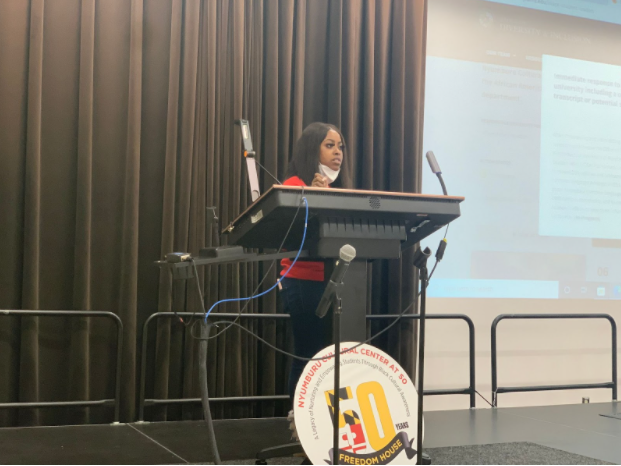The State of the Black Terps Townhall highlighted a lack of involvement from UMD’s Black community
Brianna Hayes, a public health graduate student and the graduate coordinator of MICA's Black Student Involvement committee, presenting critical issues and student recommendations dashboard. (Kayla Nazaire/The Black Explosion)
At Tuesday night's State of the Black Terps Townhall Meeting, there seemed to be one question on everyone's mind.
"Why are we the only people here?," asked senior government and politics major Kiara Anthony.
UMD's Multicultural Involvement and Community Advocacy Office (MICA) invited all Black students, faculty, staff and employees to share their opinions on issues in the Black UMD community. However, only six people showed up for the event; two were the organizers.
At the start of the meeting, Brianna Hayes, a public health graduate student and the graduate coordinator of MICA's Black Student Involvement committee, displayed an extensive list of the Black student organizations they attempted to invite. None of them were in attendance. No faculty, staff or employees were present either.
Kelsey Coleman, a junior public policy major and town hall organizer, said their outreach to other Black organizations was limited to social media because she didn't have contact information for most of them.
Hayes said that leaders of Black student organizations were in contact in the past. But virtual learning last year changed this as their network was gone as new student leaders took over.
Junior public policy major Lulit Shewan said she thinks the lack of student attendance could have been due to poor advertisement or student burnout. However, she feels another cause is students taking leadership positions as resume boosters and the focus of Black student organizations on entertainment-based events rather than activism.
However, Shewan said the responsibility of promoting these events shouldn't rely on students alone.
"I feel like there's too much pressure on leaders of Black organizations here as well to be doing all this work...some of this [responsibility] should be – especially uplifting events like this – on faculty and staff," Shewan said.
The purpose of the meeting was to discuss the progress the university administration has made on addressing the 25 demands that Black student leaders complied last spring.
This March, the Office of Diversity and Inclusion launched a dashboard to track the progress they have made on each goal. So far, the university has completed or sustained 18 of the 25 demands.
Hayes said she wanted proof that the administration actually satisfied the demands.
"We want to see the reports; we want to see the actual progress that's happening other than the blurb that they put up on the website," Hayes said before the meeting.
According to Hayes, their goal was to discuss whether UMD's Black community felt the university successfully addressed the demands in the hopes of adding to or amending the current directives.
Junior information science major Jalen Coles said he wants to see tangible metrics applied to the demands. Otherwise, he believes the status of "complete" is left up to interpretation.
Hayes said MICA plans to hold another town hall in the spring. The organizers didn't invite President Darryl Pines or Vice President for Student Affairs Patty Perillo to this town hall meeting. Hayes said the reason was for students to feel comfortable speaking their minds. However, both administrators would be invited in the spring, according to Hayes.
"Whether it's over-policing, issues with academic departments, with housing, these are things that we want to discuss so that we make sure it doesn't fall off their radar," Hayes said.

